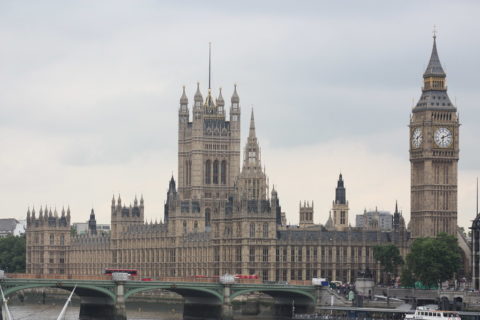Peter Hitchins provides a thumbnail sketch of the state of play before the Supreme Court was added to British constitutional arrangements:

“Palace of Westminster” by michaelhenley is licensed under CC BY-NC-SA 2.0
Why did we never even have such a body until ten years ago? As we shall see, it would have been, and still is, a contradiction in terms. But in interesting times such as these, elephants fly, fishes walk, figs grow on thorns, and oxymorons inherit the earth.
The most powerful law court in the land was, by a curious paradox, not in the land at all, but based in tiny Luxembourg, across the Narrow Seas which have kept invaders from our door but are useless against bureaucratic takeovers by the European Union. There sits the European Court of Justice, which as long ago as 1990 established that it could tell British courts to overrule British Acts of Parliament when they conflict with E.U. law. It can carry on doing this until we eventually do leave the E.U., if we ever do.
These various messes came about because we are so old, and rely so much on convention and manners, that it is all too easy for unconventional and ill-mannered busybodies to come storming in with new ideas. England’s constitution was not planned and built, like America’s. Instead, it grew during a thousand years of freedom from invasion. Both are beautiful in their way. America’s fundamental law has the cold, orderly beauty of a classical temple. England’s has the warmer, more chaotic loveliness of an ancient forest. It seems to be wholly natural but, when examined closely, it shows many signs of careful cultivation and pruning. Our powers are not as separated as America’s, but slightly tangled. Still, it has worked well enough for us over time.
Any thinking person must admire both the American and the English constitutions as serious efforts in a world of chaos, despotism, and stupidity to apply human intelligence to the task of giving people ordered, peaceful, and free lives. They have a common origin in the miraculous Magna Carta, which Americans often revere more than modern Englishmen do. We in England have grown complacent about our liberty, and have become inclined to forget our great founding documents.
But the two constitutions are not the same, and in my view they are not compatible. For my whole life, until a few years ago, the very idea that England should have a Supreme Court was an absurdity. The Highest Court in England is the Crown in Parliament which, as I was once taught, had the power to do everything except turn a man into a woman. In these more gender-fluid times, that expression is not much used. But it contains the truth. Parliament can make any law and overturn any law, made by itself or by the courts.
That is why England (often to my regret) lacks a First Amendment and cannot have one unless we undergo a revolution. No law in England could possibly open with the words “Parliament shall make no law.” Our 1689 Bill of Rights, the model for the U.S. Bill of Rights a century later, tells the king what he cannot do and the courts what they cannot do. It grants me (as a Protestant) the right to have weapons for my defense. But while it draws its sword against arbitrary power, it puts a protective arm round Parliament.



